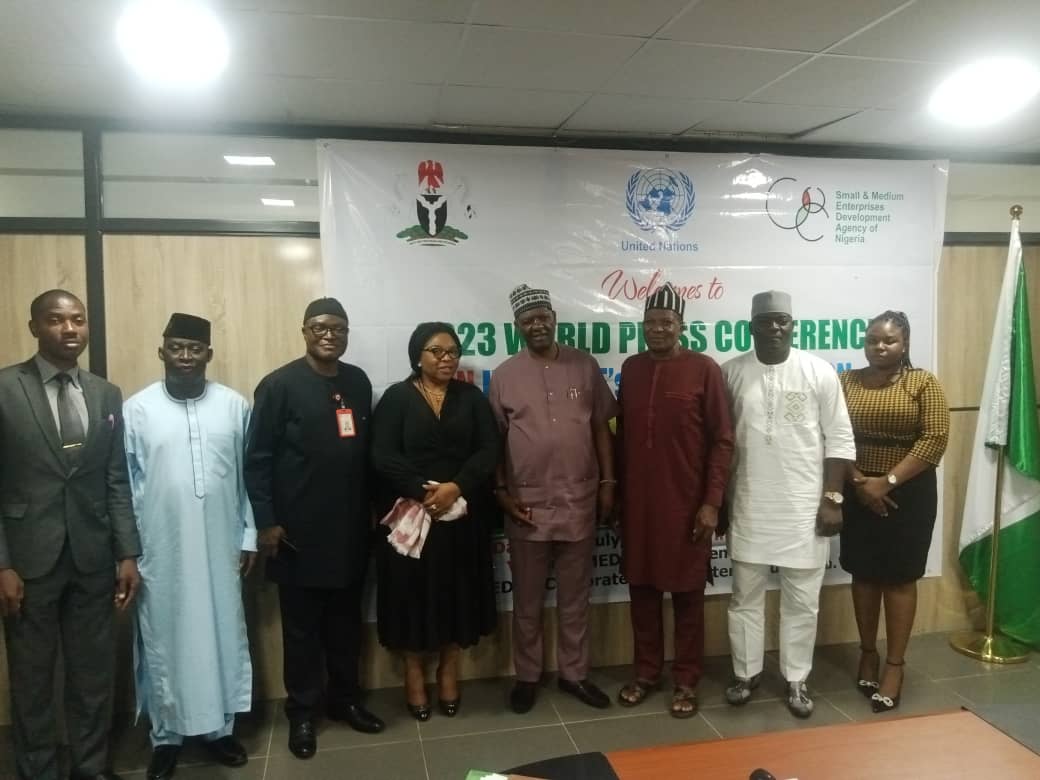The Small and Medium Enterprises Development Agency of Nigeria is seeking more partnerships with banks to bridge the huge funding gap within the Micro, Small and Medium Enterprises sector of the economy estimated at over $158bn.
The Director-General/Chief Executive Officer of SMEDAN, Dr Olawale Fasanya, said this on Monday at a press conference to commemorate the World MSME Day.
Advertisement
The SMEDAN Boss said already, the agency has opened discussions with Sterling Bank Plc, Jaiz Bank Plc, Bank of Industry and other banks to upscale the matching fund programme.
According to him, the discussions are already yielding results as Jaiz Bank Plc has entered into partnership with SMEDAN to create a matching fund of N1.2bn for MSME development.
He said based on the understanding, the bank would provide N600m while SMEDAN is making up the balance of N600m, noting that the fund would be given out as low interest loans to MSMEs that needed funding of between N500,000 and N2.5m.
The SMEDAN Boss said, “In the Agency’s efforts to bridge the huge funding gap within the MSME community which has been put at over $158bn, SMEDAN initiated the Matching Fund Program for the Micro and Small Enterprises especially those in Agribusiness.
Advertisement
“The intervention delivers credit as a promotional mechanism to enhance enterprise output, competitiveness and job creation. Prospective beneficiaries can access loans between N500,000 and N2.5m. The Agency seeks partnership to deepen the reach of this initiative.
“Closely related to the Matching Fund program of the Agency is the establishment of the SMEDAN’s Micro Finance Bank. Understanding that the Nano and Micro enterprises that constitute about 90 per cent of the MSMEs in Nigeria face major challenge in accessing regular financial institutions’ credit facilities, SMEDAN is helping to bridge the gap through an MFB designed along the India and Bangladeshi model to provide easy access to loans at reduced interest rates with minimal room for default.”
Fasanya added that MSMEs are very critical components of the overall economy which obviously drive home the need to enable them self-develop in a wider and enabling eco-system.
He said the establishment of SMEDAN to cater for the growth and development of the MSMEs in Nigeria is in line with global best practices, adding that over the years, SMEDAN has been able to attend to some of the constraining issues of MSMEs development through the provision of policy frameworks.
“The MSME policy initiation and implementation space is no doubt very complex as it cuts across the boundaries or mandates of Ministries, Departments and Agencies as well as across levels of government and the private sector practitioners.
Advertisement
“The emphasis of the revised National Policy has been on addressing the development of the sub-sector through a coordinated mechanism that will ensure robust provisions and measures that will subsequently engender an active and prosperous MSME sub-sector.
“The policy document has been able to take into account the changes in regulations, markets and technologies that occur across borders which could affect MSMEs’ opportunities and performance and it is our hope that Stakeholders will congruent on the document to develop the sub-sector,” he added.
According to the last survey jointly conducted by the National Bureau of Statistics (NBS) and SMEDAN in 2020, MSMEs in Nigeria did relatively well in their contributions to both employment and the GDP as they were responsible for 46.31% of the GDP and over 84% of total employments.
However, the sub-sector only contributed 6.21% to the total export basket of Nigeria which is abysmally low when compared to other emerging economies.
But Fasanya said that based on the statistics, MSMEs in Nigeria are not globally competitive hence the need to ensure that the narrative is changed more especially with the anticipated impact the fuel subsidy removal would have on the sub-sector.
While expecting more deliberate and coordinated supports from other key stakeholders, he explained that SMEDAN is already implementing support systems that can serve as the launch-pad for MSMEs development.
Advertisement
He added, “The Agency’s interventions essentially seek to address the challenges that border on capacity building, advocacy, access to finance/funds, technology/equipments, markets, raw materials, data and putting in place appropriate policy framework.
“In line with the National Policy on MSMEs’ identification of Finance as one of the key priority areas, SMEDAN has been involved in sustained advocacy visits to both private and public organizations that are into funding with the hope of availing MSMEs easier access to useable loans. With the persistent funding challenges still experienced, the Agency initiated some programs with some funding components.
“One of such programs is the Conditional Grant Scheme (CGS) which, in the first instance seek to cause a reduction in the size of the informal Nano and Micro enterprises which the NBS report put at over 38 million.
“Part of the conditions for accessing the grant is the willingness to become formal in operations. It involves capacity building, registration of the micro enterprises with the CAC, provision of micro insurance, opening of bank accounts and provision of grants (N50,000 each). There are over 75,000 beneficiaries of the CGS program across the States since its inception in 2017.”
To address the challenges of sourcing for funds, equipment, workspace, power and other key requirements either for expansion or start-up, he said the agency has been able to procure latest equipments/machines using the Common Facility Center (CFC) model to cut down on operating costs and to enable them become competitive not just in pricing but also in quality.
So far, he said the CFCs has been established in Abuja (Garment, Furniture and products packaging), Katsina (Garment), Kaduna and Nnewi (production of automotive components) and Ikorodu (packaging of Fast Moving Consumer Goods FMCGs).
ENDS



